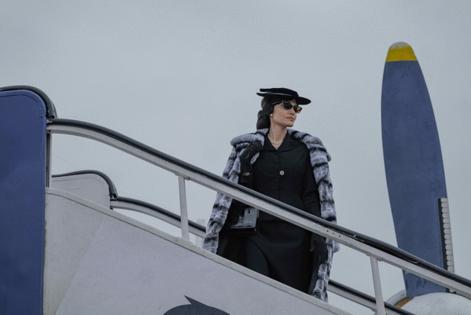'Maria' review: Angelina Jolie finds spiritual connection with opera diva Maria Callas
Published in Entertainment News
Director Pablo Larraín is fixated on immensely powerful women in times of great personal crisis, but the startling emotional intimacy he brought to stories about Jacqueline Kennedy ("Jackie") and Princess Diana ("Spencer") is lacking in "Maria," his portrait of opera's supreme diva, Maria Callas.
Angelina Jolie plays Callas in a performance that trades on the actress' otherworldliness; it takes a diva to play a diva, and Jolie's portrayal fits her subject. Jolie, especially in the present, doesn't quite seem to walk among us, and that sense of disconnected grandeur lends itself well to Callas, who felt like she floated in a different sphere than the rest of us mere mortals.
But in Larraín's telling, Callas is a difficult subject to know, and that distance keeps "Maria" at arm's length.
Jolie plays the New York-born Greek singer (real name: Maria Kalogeropoulos) who died in Paris in 1977 at age 53 as a woman so used to being famous and adored that she practically watches herself from above. "Maria" depicts the final week of her life, when she's addicted to pills and imagining a TV documentary crew, led by Mandrax (Oscar nominee Kodi Smit-McPhee), following her around. (Mandrax is also the name of one of her medications, which lets you know what kind of terrain we're traversing.)
Callas is fond of the attention she garners in public — "I'm not hungry," she says during a trip to a café, "I come to restaurants to be adored" — which is as normal to her as the oxygen she breathes. That attention is her identity, and without it she may cease to exist.
As the movie picks up, Callas hasn't sung for years, and she's attempting to mount some sort of a comeback, if only for herself. In these scenes, Jolie's voice is blended with Callas' powerful vocals, which forms another emotional disconnect, as the voice emanating from her is not quite her own.
Callas is followed around in her compromised state by two assistants, played by Pierfrancesco Favino and Alba Rohrwacher, who are concerned for her well-being, even as they're put through a sort of emotional torture from their boss. They see, just as we do, that an end is rapidly approaching, and there's nothing they can do to stop it.
Larraín also stages flashbacks where his worlds blur a bit as Callas has a dalliance with Aristotle Onassis (Haluk Bilginer), her lover, and also takes a meeting with John F. Kennedy (Caspar Phillipson), where she's the one at the table with the power.
Callas makes for a fascinating figure, and Larraín clearly has a fondness for his subject, even as the script by Steven Knight (who also penned "Spencer") fusses with her truth. "As of this morning," Callas says in the story, "What is real and what is not real is my business." It's part of what makes this opera easy to like but hard to love.
———
'MARIA'
Grade: B-
MPA rating: R (for some language including a sexual reference)
Running time: 2:04
How to watch: Netflix
———
©2024 www.detroitnews.com. Visit at detroitnews.com. Distributed by Tribune Content Agency, LLC.













Comments